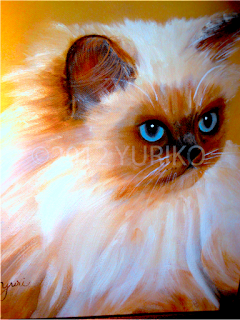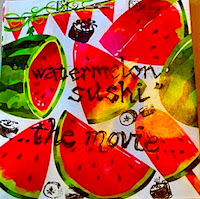Aloha,
Hip Hapa Homeez!
 |
Sarah with her son Malcolm
|
Lucky us, we’re back to interviewing intriguing
Hip Hapa Homeez. In this blog post, we’re featuring the fabulous Sarah Doneghy who hosts her own shows discussing the plight of us multi-cultis.
Q: Sarah, please discuss your parents’ backgrounds and how they met.
A: My Dad is black, my Mom is white. My Dad is American, my Mom is English. My Dad is Muslim, my Mom is Catholic. They met when my Dad was traveling around the world on his bicycle. The people he was staying with in Germany knew a place he could stay in England. One of the people living at that place in England was my Mom. That’s how they met.
 |
Sarah's mum
|
 |
Sarah's dad
|
Q: What was it like growing up in West Virginia?
A: A few months ago I looked up, “Most racist state in America”. The answer was, “West Virginia”. Growing up, there weren’t very many black families, and we were the only mixed-race family. There was a lot of racism.
The first time I was called the n-word I was seven. I got bullied in school a lot. I remember when I was a teenager being kicked out of people’s houses because I was black or, “colored” or, of course, the n-word. Then there were friends who would ask me to lie to their parents and tell them I was Native American or “anything but black”.
My first One Person Show, “Mixed Nut” was a coming-of-identity story. I talked a lot about what growing up in West Virginia was like in that.
Q: Do you think mixed-race issues are any different now, 54 years after Loving v. Virginia?
A: That’s what I’m trying to discover. My Dad grew up in segregation in West Virginia. He was the first black student to attend a desegregated school there. The stories he’s told me about the racism he’s received are absolutely horrible and heartbreaking. I don’t know how he survived it.
The racism I experienced growing up is definitely different than what he did.
I think one of the issues that has changed is that people have more freedom in how they choose to identify. There’s more language now for people who are more than one race. They don’t have to choose one race and they also can.
It’s hard to know what is meant by “mixed-race issues”. There are so many mixes of so many different races. I’m not sure if there are mixed-race issues as a whole. I think racism, at least in America, is a big commonality when it comes to what we’ve experienced. But again, that’s what I want to find out.
I don’t know how this issue has changed, but I think every mixed-race person has a coming-of-identity story. They see that their families look different from them and different from each other depending on the situation. There’s always the “Where do I fit in” journey. I think we all have had to ask, “What are you?” of ourselves.

Q: Since you’re both black and white, but ethnically ambiguous, what are the most shocking things you’ve heard either race group say about the opposite?
A: I dealt with so much racism early in life that I’ve never really been shocked by what people have said not knowing that I’m mixed-race. I’ve been more shocked by what people have said around me even though they do know I’m black mixed.
Something happened a few years ago that I am still angry about and hurt over. It was the day of the eclipse and I was hanging out with two white friends—a guy and a girl. These are people I had known for a while. The girl was complaining about a kid she worked with and then called him a “n*gger”. “What?!” I was stunned. I really couldn’t believe what I had heard and then she doubled down. Yeah. That was indeed what she said. I went off on her. “How could you say that? What is wrong with you? You know I’m black!”
Meanwhile, the guy didn’t say anything. He stayed completely silent. When I confronted him about his silence he said, “She made a mistake. That’s all.” That right there shocked the hell out of me. He got mad at me when I called her a racist. I was the one that was overreacting. I had offended him. And these are people saying, “Black Lives Matter” and “F*ck Trump”. They don’t even see their hypocrisy—their racism—and don’t want to. I haven’t spoken to either of them since.
Q: Why did you create your show, Mixed Messages, and what do you hope to accomplish with it?
A: I made this show first and foremost for us. I wanted to create a space for us to have these discussions. These are conversations that need to be had and stories that need to be told. I think it’s important for people to know about mixed-race experiences. People need to hear from us and we need to hear from each other. There are so many similarities as well as so many differences. I am really interested in people’s stories. I’ve learned so much already.
 |
| Sarah with her sister |
 |
| Sarah with her brother |
In the first episode, Marcus talks about how his mom is racist. I didn’t know how common that was in mixed-race families until people wrote me saying how much they related to that. I’m privileged in that I never had to deal with that in my family. Marcus facing racism in his home was one of the things a lot of viewers couldn’t believe and, sadly, so many could.
 |
| Sarah with her brother |
I’m really excited to meet new people and hear different narratives. There’s something about getting together with someone and knowing that you don’t have to explain things. We already know. We’ve all been on a racial identity journey. And it’s often one we continue to travel. That’s unique to us. Every mixed-race person has the racial identity discovery story. I think it’s fascinating and fantastic. I want to hear as many of these as possible.
If you are interested in being a guest on Mixed Messages, or have a topic you’d like to see discussed, please email Sarah at:
mixedmessagestheshow@gmail.com
And, don’t forget to watch:
Meanwhile, Hip Hapa Homeez, we’ve been struggling to keep our websites updated. As you may know, our “War Brides of Japan, a docu*memory” 5-part series is currently on hiatus. But there are numerous trailers and interviews you can watch on Vimeo and Youtube.
Here are our top performing websites:
Until June 30, I am very much
Your Hip Hapa,
Yayoi


























